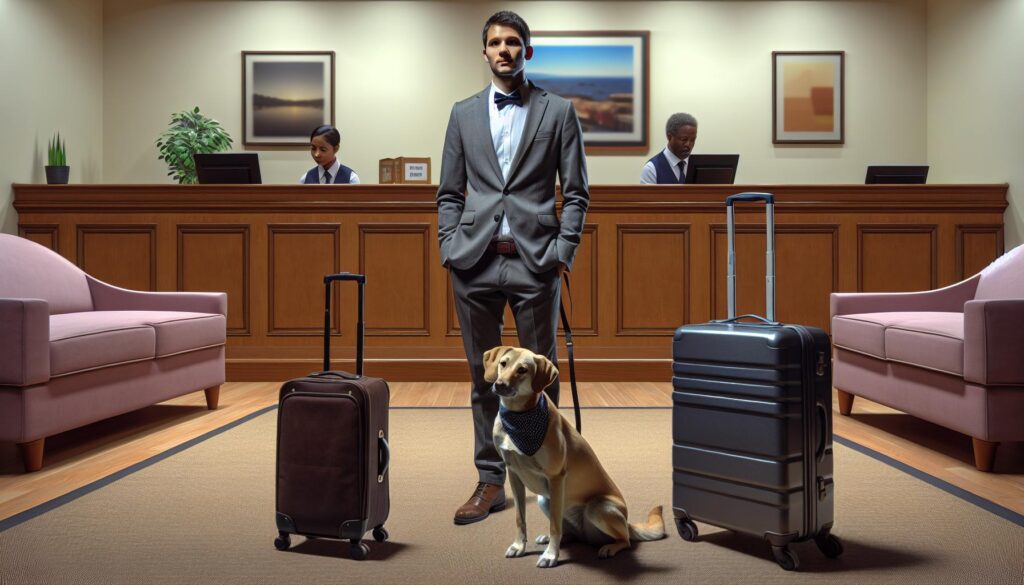Traveling with your fluffy companion can turn a standard hotel stay into a cozy, tail-wagging adventure. But before you pack your pet’s favorite toy and hit the road, you might wonder if you need an emotional support animal (ESA) letter for hotels. It’s a valid question, especially with the ever-changing policies and the fine line between pet-friendly and ESA-accommodating establishments.
Navigating the hotel world with your emotional support buddy doesn’t have to feel like solving a Rubik’s cube with your eyes closed. Understanding the ins and outs of hotel policies on ESAs can save you from unnecessary headaches and ensure both you and your furry friend enjoy a hassle-free stay. And we’ve got what you need to know about securing that all-important ESA letter for your next hotel visit.
Emotional Support Animals and Trip Planning
Navigating through hotel stays with your ESA involves understanding both your rights and the responsibilities that come along. Under the Americans with Disabilities Act (ADA), service animals receive a distinct classification from ESAs, leading to different acceptance policies across hotels and accommodations. This distinction is key as it shapes the policies that hotels enforce regarding animal guests.
For ESAs, the key document you’ll need is a legitimate emotional support animal letter, prescribed by a licensed mental health professional. This letter verifies your need for the ESA and explains the role it plays in managing your mental health. Having this letter is essential when planning a hotel stay, as it serves as the official documentation required by many accommodations to permit your ESA’s stay.
However, bear in mind, not all hotels are obligated to accept ESAs. Their policies might vary significantly, ranging from fully welcoming your ESA to allowing their stay under specific conditions, such as paying additional fees or providing advance notice. In rare cases, some hotels might not accommodate ESAs at all, citing reasons like safety concerns or potential allergies of other guests.
When booking your hotel, direct inquiry about their ESA policies can save you from unexpected situations. It’s also prudent to keep your ESA’s letter handy during check-in, ensuring a smooth process. By taking these steps, you’ll enhance your travel experience, ensuring that both you and your supportive companion enjoy a comfortable and stress-free stay.

Emotional Support Animals and Accommodation Laws
Unlike service animals, which are protected under the Americans with Disabilities Act (ADA), ESAs fall into a more nuanced category without the same federal protections in public accommodations, including hotels. However, some states have enacted their own laws that might offer broader rights to ESA owners.
Familiarize yourself with the Fair Housing Act (FHA). While it primarily covers housing policies, it sets an important precedent for accommodation policies by prohibiting discrimination against individuals with disabilities, encompassing those requiring emotional support animals. This means if you’re staying in a place that also offers long-term leases, there’s a possibility the FHA could provide some protection for your ESA.
When you’re planning a hotel stay, remember that each establishment may have its policies rooted in state law or their interpretation of the ADA and FHA—knowing these can provide leverage when discussing your needs. If a hotel does claim to accommodate ESAs, they might ask you to provide your ESA letter. This document proves your need for the animal and must come from a licensed mental health professional.
Get familiar with both federal and state laws regarding ESAs. Research your destination’s specific accommodation laws, and arm yourself with a valid ESA letter and knowledge of your rights. This preparation allows you to advocate effectively for yourself and your emotional support animal, ensuring a smoother travel and lodging experience.
The Importance of an Emotional Support Animal Letter
This letter serves as your passport in environments where the presence of animals is typically questioned or outright restricted. Signed by a licensed mental health professional, the ESA letter confirms that your animal is more than just a pet; it’s a vital part of your emotional or mental well-being.
First and foremost, this letter solidifies your rights under certain laws that protect individuals with ESAs. While not all accommodations are mandated to accept ESAs, presenting a legitimate ESA letter often facilitates an understanding and can lead to a negotiation in your favor. Hotel managers and staff are more likely to consider your request once they see official documentation. It’s not about bending rules but rather about acknowledging your needs and finding a middle ground.
Moreover, the letter provides a clear distinction between ESAs and pets. Unlike pets, ESAs are prescribed to help manage emotional or psychological disorders. This distinction is key in settings where pets might be limited to specific areas or not allowed at all. By presenting your ESA letter, you clarify that your animal companion is essential for your emotional stability, which can help in circumventing pet policies that would otherwise apply.
Navigating the legal landscape with your ESA can be smoother with this letter in hand. It serves as a tangible proof of your need for an ESA and can be instrumental in discussions with hotel management about accommodations. While some might be unaware of the specific laws and rights surrounding ESAs, your letter can serve as an educational tool, paving the way for a more inclusive approach in the hospitality industry.
Emotional Support Animals in Hotels
Navigating hotel stays with your emotional support animal (ESA) requires a bit more preparation than typical travel scenarios. Most importantly, understanding hotel policies on ESAs can make or break your stay. Unlike service animals, which are covered under the Americans with Disabilities Act (ADA) and thereby have access to public accommodations, ESAs fall into a more complex category. Hotels, being private entities, can opt to set their own policies regarding ESAs.
Contacting the hotel beforehand is key. This step not only clarifies their stance on ESAs but also allows you to discuss any accommodations they might offer. Since not all hotels understand the difference between ESAs, service animals, and pets, having your ESA letter handy streamlines this conversation. It provides a legitimate document indicating your need for the animal, helping hotel staff accommodate you more effectively.
Remember, the ESA letter you present should be current, typically within the year, and include a licensed mental health professional’s evaluation and signature. Clarify with the hotel if they require the letter upon booking or at check-in, as policies may vary.
While some hotels may welcome ESAs without open arms due to lack of legal obligations, others might recognize the value of supporting all guests, including those with ESAs. You’ll find establishments that go above and beyond, offering amenities such as pet beds, bowls, and even a designated area for your ESA to relax.
Do bear in mind, even if a hotel accommodates ESAs, they might impose specific conditions such as size limits, the number of animals allowed, or additional cleaning fees. Ensuring you’re aware of these stipulations ahead of time can help avoid unwelcome surprises during your stay.
Practicing good ESA etiquette—ensuring your animal is well-behaved, not disruptive to other guests, and is always under control—solidifies a positive experience for everyone involved. It’s about finding a balance that respects the hotel’s operational needs while addressing your emotional and mental health support requirements.
Preparing for Hotel Stays with Your Emotional Support Animal
When planning a stay at a hotel with your emotional support animal (ESA), a bit of preparation goes a long way to ensure smooth sailing. Here’s a checklist to help you get ready for the trip.
Research and Contact Hotels
Start by identifying pet-friendly hotels but don’t stop there. Even hotels with open pet policies might have different rules for ESAs. Once you’ve shortlisted the hotels, give them a call. Confirm their ESA policies and inquire about any fees or documentation they require. Mention your needs and ask about the amenities available for your ESA, such as dedicated play areas or complimentary treats.
Update Your ESA Letter
Ensure your ESA letter is up-to-date and issued by a licensed mental health professional. Hotels might ask for this documentation, and having it ready demonstrates responsibility and respect for the hotel’s policies. Remember, the letter should not be older than one year, as that’s the standard validity period for such documents.
Pack Essentials for Your ESA
Pack all necessary items for your ESA’s comfort and wellbeing. This includes their favorite toys, enough food for the duration of the stay, a water bowl, and any medications they might need. Don’t forget a leash and waste bags to maintain cleanliness during your stay.
Practice Good ESA Etiquette
Good ESA etiquette is key for a pleasant hotel stay. This means ensuring your ESA is well-behaved and doesn’t disturb other guests. If your ESA isn’t used to traveling or being in new environments, consider doing some preparatory training. This helps them stay calm and makes the experience better for everyone involved.
By following these steps, you and your ESA will be well-prepared for a comfortable and hassle-free stay at any hotel.
Conclusion
Navigating hotel stays with your emotional support animal doesn’t have to be stressful. Armed with a current ESA letter and a proactive approach to contacting hotels about their specific policies, you’re setting the stage for a smooth experience. Remember, the key is in the preparation—updating your ESA letter, packing essentials, and practicing good etiquette. By taking these steps, you ensure that both you and your ESA can enjoy your travels to the fullest, making every hotel stay comfortable and hassle-free. So before you pack your bags, make sure your ESA’s paperwork is in order and reach out to your accommodations. It’s the best way to ensure a welcoming environment for you and your support companion.











